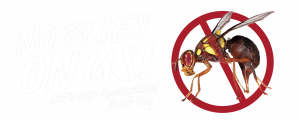Help break the breeding cycle
Spring provides an opportunity to break the breeding cycle of Queensland Fruit Fly (Qfly) by limiting fruit available to the pest and preventing new generations taking hold.
During spring peaks, fruit fly lay their eggs in late-hanging and early blossoming fruit. After laying their eggs these flies die out in October and November resulting in a drop in the number of flies trapped, however these flies leave their eggs, larvae and pupae hidden on the landscape ready to mature and emerge as adult fruit flies in late November and early December.
If flies are unable to find fruit, this spring peak may not eventuate in providing the new generation of fruit flies, which leads to summer infestation. It is important to ensure all unwanted fruit is destroyed and all wanted fruit is harvested or protected against fruit fly stings, in order to help break this cycle.
Working together to stop fruit fly
Qfly numbers have declined over the past three years in rural areas, however this decline has not been as good in built up, urban locations. Controlling Qfly in urban situations is more difficult than in rural conditions. Urban areas typically provide more comfortable weather conditions, a greater diversity of fruit and fewer effective control options; all of which offer ideal conditions for fruit fl y proliferation. Very few pesticides are approved for use in home gardens. Most other strategies such as baiting and trapping will not control Qfly unless everyone is working together using baits and traps across the whole town and urban area.
Advice for home gardners
If urban fruit flies in built up areas and townships are not controlled sufficiently, populations will expand over the next two generations and spread into commercial orchards in late summer and autumn. The efforts of home gardeners to control Qfly in spring 2020 will be of immense use to commercial growers and the entire community in autumn 2021. With adequate and community-wide monitoring and protection against Qfly, home garden producers will also enjoy the benefits of fewer Qfly destroying their produce, in addition to assisting their commercial neighbours.




